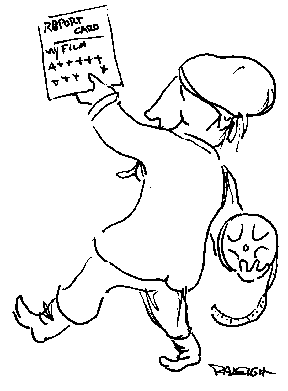 |
Report Card
By
HENRY P. RALEIGH
ART TIMES April 2008
PREMIERE MAGAZINE IS out of business. Well, thatís what it gets for having
ignored me for all these years. The annual fifteen critic evaluation
of 2007ís one-hundred films is no longer available for my insightful
analysis. The summation, such as it is, has been taken up by Entertainment
Weekly in a more populist and abbreviated manner. Theirs appeared
in late December — ten print critics from Boston to Los Angeles
and two of their own assessing fifty American films of 2007. Curiously,
reviewers from Deep South publications are seldom, if ever, included
in any of these gatherings of critics. Alabama and Tennessee might take
note of this.
Now Entertainment Weeklyís scoring of films eschews little boxes
with dots or colors, stars, ascending and descending thumbs, frowning
and smiling icons. EW chooses from among the first six letters of the alphabet, straight forward,
in the form familiar to every family with children: the Report Card,
that was borne home proudly or reluctantly, as the case may be, and
was once forwarded to parents of a college student, but no longer is
since now claimed to be privileged information although the tuition
isnít and goes straight to the payer, which is just about all youíll
ever learn of your childís college career.
Aís,
Bís, Cís, Dís and Fís, along with those plus and minus modifiers — that is how EW does it. And as every kid knows, the modifiers
are there to be used as you desire. A B– is a solid B and to hell
with it. A C+ is handily interpreted as ëpractically a Bí. C grades
and lower barely exist any longer on report cards. School taxes and
college tuition demand we get more for our money than a bunch of lousy
Cís, I can tell you. As a matter of fact, it is rumored that academe
may excise C from the alphabet. Columbia and Colgate Universities are
raising some objections.
EW is well aware of our cultural needs in report cards and has provided
this survey with a perfect blizzard of Aís and Bís. Hollywood studios
should be delirious with joy over the ëcumsí their films have earned
this past year: nine Aís and twenty-one Bís out of fifty and thatís
before upgrading those B+ís to ëpractically Aísí. Only eight Cís but
four of these bear pluses which makes them ëpracticallyí a B. OK, so
three of the remainders are minuses but thatís really a quite respectable
C, isnít it? Shamefully, a D grade does appear for ìNorbitî and so did
one for ìGeorgia Ruleî but with a plus it obeys the rule of ëpractically
a Cí.
All-in-all,
2007 must have been a great year in film. Surely few can quarrel over
the top A films, among them ìNo Country for Old Menî, ìThe Diving Bell
and the Butterflyî, ìAtonementî — ìThe Lives of Othersî heading
the list with a perfect, complete unto itself, A. ìThere Will Be Bloodî
is absent but if its release date had been earlier than December 26,
Iím certain it would have been up there with the best of them, maybe
bumping down ìThe Bourne Ultimatumî which wouldnít bother me a bit.
There
are a couple or so in the B category that may give you pause, even a
raised eyebrow. ìDan in Real Lifeî and ìHairsprayî do sit uncomfortably
next to ìCharlie Wilsonís Warî and ìWaitressî — still the ten
critics were consistent enough in tossing out Bís all over the place,
each film receiving but a single C. The C category is a lot more questionable;
one might figure less kindly and generous critics would have dumped
most of these, as ìEvan Almightyî and ìGhost Riderî, into the dust bin
of the Dís — there was ample room there. No Fís in this report
card; not surprising seeing how much goodness has been lavished over
forty-nine films — nor can I recall EW ever employing the
hateful F grade in its weekly reviews. Like the academic C, F has been
discarded as, I guess, politically incorrect or damaging to a filmmakerís
self-esteem or just plain not nice.
It is encouraging to note how marvelously these ten critics can agree
with one another. If only our Congress could do the same. Itís almost
spooky, you know, and I will venture the theory that this is the result
of a grading system that makes free use of pluses and minuses. Any old-time
college professor will tell you how much simpler it became when grading
introduced those little-bitty accompanying marks. Over night you no
longer had to be irrevocably decisive, those dear marks permitting you
to fudge like there was no tomorrow. Perhaps Congress could give it
a try — it does like that sort of thing.
